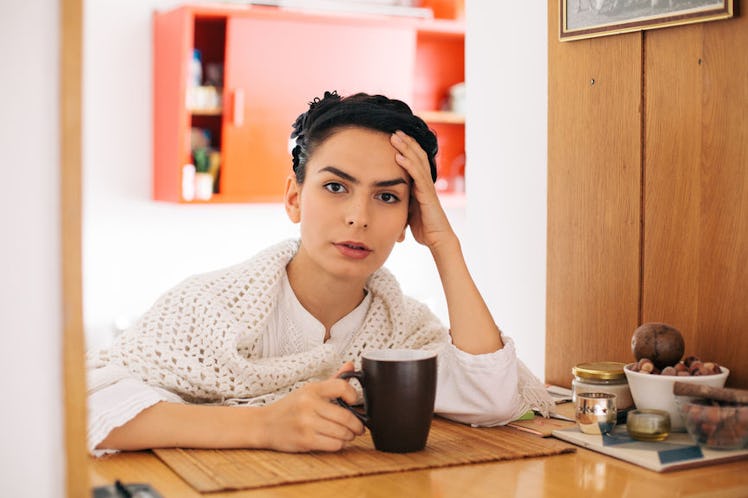
A Nutritionist Reveals The 4 Biggest Struggles You'll Face If You Give Up Coffee
For reasons I truly cannot understand, over the past few weeks my body seems to have decided it doesn't want coffee anymore. The drink I once craved like no other now makes me feel sick. While I've spent every morning since high school savoring a cup of hot coffee, I'm beginning to come to terms with the fact that at least for now, it seems I'll have to give up that precious part of my morning routine. If you've found yourself in the same coffee-free boat, there are some signs of caffeine withdrawal that you should definitely be prepared for. Hint: They're not very pleasant.
However, there is a silver lining: According to Monica Auslander Moreno, MS, RD, LD/N, a nutrition consultant for RSP Nutrition, if you're looking to cut out coffee from your diet, you might be able to reduce the severity of the caffeine withdrawal side effects by making the change gradually rather than going cold-turkey. "It may be more palatable to do a gradual wean so the side effects and psychological craving isn't as severe," she tells Elite Daily over email. One easy way to do this is to cut down your daily dose of the good stuff little by little. Either reduce your cup count, or mix in some decaf grounds with your usual coffee of choice to slowly train your body to go without caffeine.
As for how long you can expect to feel some of these sluggish side effects, Moreno says it can vary greatly depending on your metabolism, as well as other individual health factors. For a point of reference, Moreno tells Elite Daily that one of her recent clients adjusted to the switch 10 days after giving up coffee. That doesn't sound so awful, right?
Whether it takes your body 10 days or an entire month to learn to run caffeine-free, watch out for the following withdrawal signs so that you know exactly how to address them.
Intense Dehydration
"A lot of people sadly use coffee as their only liquid hydration, so if they can't have it, they're dry as a leaf," says Moreno. So if you're someone who usually drinks only coffee for breakfast, be sure to fill up your water bottle first thing in the morning once you cut out caffeine. While your water intake will depend based on your activities, the heat, and whether you've exercised, Moreno explains, she suggests aiming for at least two liters a day as a solid baseline.
Constant Caffeine Cravings
For me personally, a huge appeal of coffee is the ritual of taking some time to savor the drink each morning. Once you've cut out this part of your day, though, Moreno says your brain may continue to crave the habit, and not necessarily the caffeine or drink itself.
Thankfully, there are ways to keep the soothing ritual alive sans coffee. "Try replacing coffee with hot, caffeine-free tea," suggests Moreno. "Your brain associates imbibing hot liquid with an energy boost, so you may be conditioned to feel that energy with any hot liquid."
An Energy Slump
Besides making sure to stay hydrated now that you've cut out coffee, one huge way to combat the energy drop that can often accompany quitting coffee, according to Moreno, is to turn your focus to the foods you're eating. Especially if you used to substitute breakfast with a cappuccino, you may have been tricking your body into making you feel energized by just caffeine, instead of healthy, nutritious foods, Moreno tells Elite Daily. "Strawberries and watermelon combined with some protein (like some nuts) can give you a similar mid-afternoon boost to replace coffee," she suggests.
Raging Headaches
Another super frustrating symptom of caffeine withdrawal you could run into is recurring headaches, says Moreno. But here's the great news: Dark chocolate may be able to solve everything. "The magnesium [in dark chocolate] may aid the headache," she explains, as cacao has been linked to soothing, calming effects on the body via certain neurotransmitter actions in the brain. In fact, a 2014 study published in the International Journal of Health Sciences found that eating 40 grams of dark chocolate every day over a two-week period significantly lowered people's anxiety levels.
Honestly, when you think about it that way, trading your morning latte for a daily dose of chocolate just might be worth the switch.